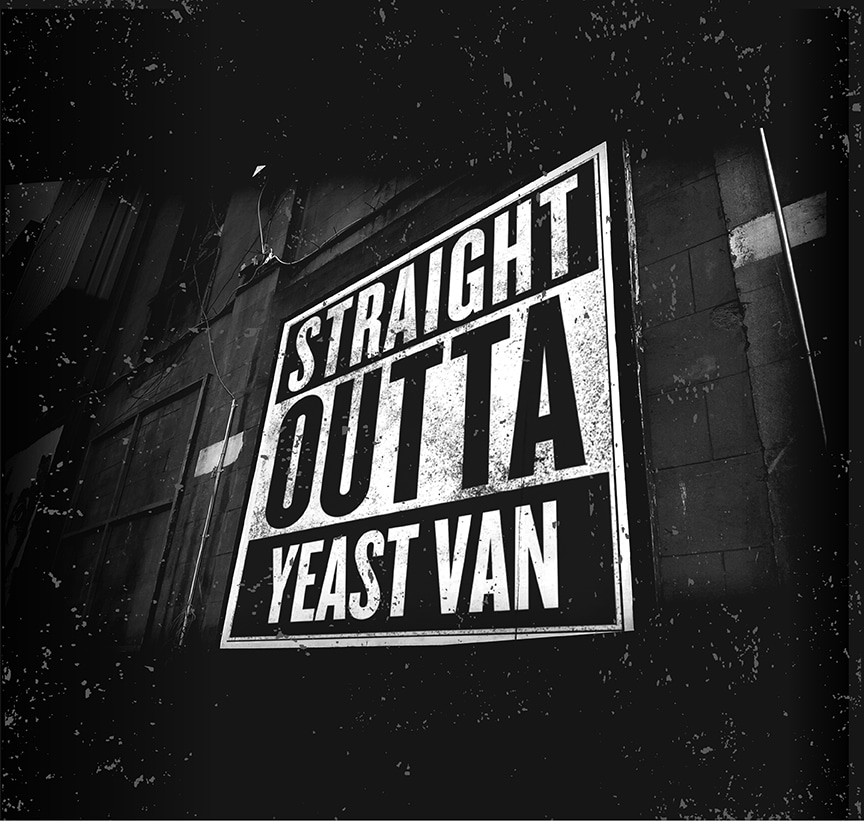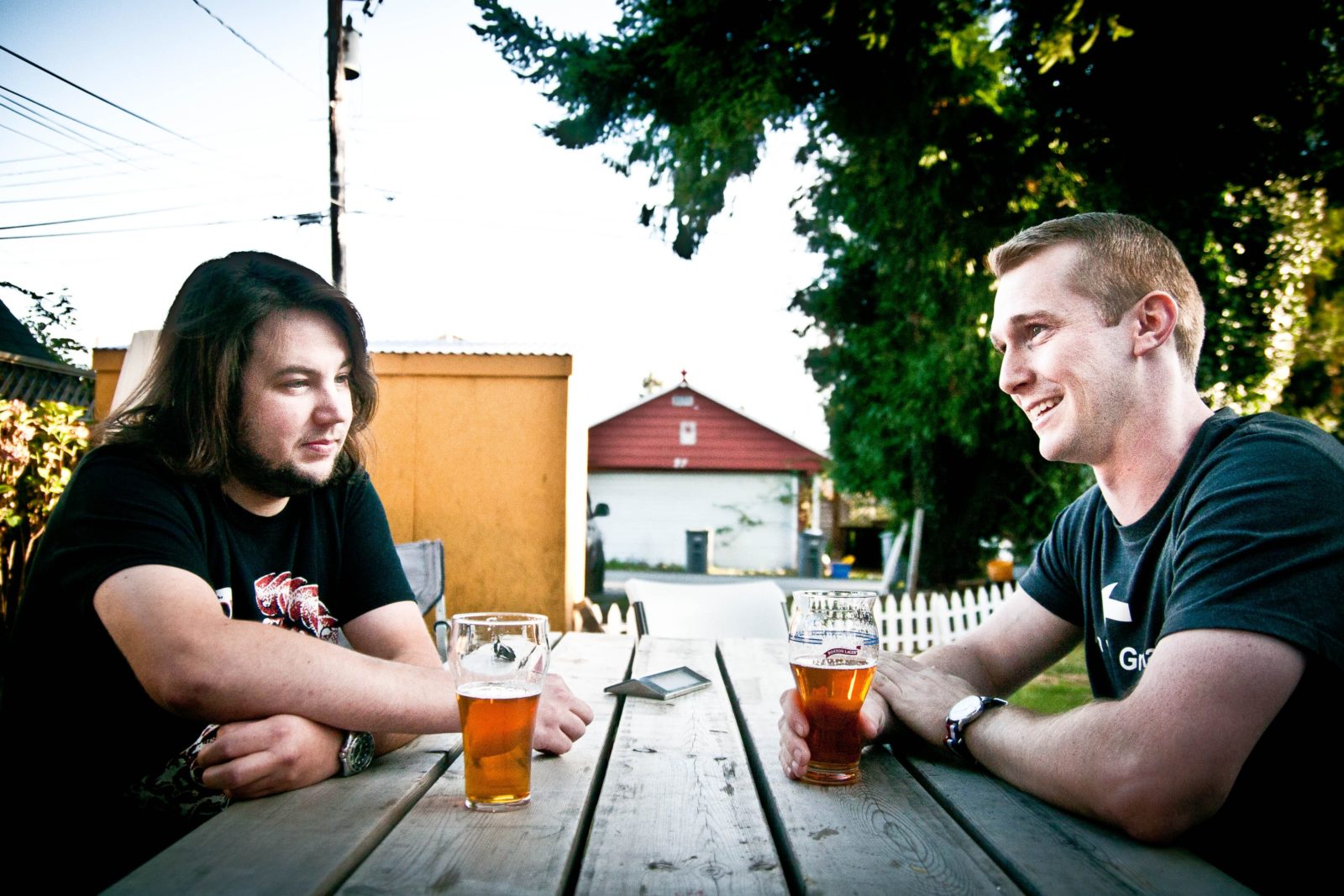
…AKA The Comox Valley Edition
The craft beer industry in B.C. has come along way since Frank Appleton first started making beer in converted dairy equipment at the now defunct Troller Pub in Horseshoe Bay more than 35 years ago.
Michael Tymchuk, 54, has been there pretty much from the beginning. The Cumberland Brewing Company co-owner and brewmaster got his start in the 1980s at Spinnakers, the country’s oldest brewpub, and has had a hand in setting up craft breweries across Western Canada and Asia. For much of his brewing career, Tymchuk and his contemporaries were on the frontlines of the craft beer revolution, liberating drinkers from the evil clutches of fizzy macro swill.
Meanwhile, Gladstone Brewing Co.’s Tak Guenette, 28, is one of a new breed of brewers that has benefitted from the pioneering work of those who have come before them. With the hard work of converting the masses to craft already done, Guenette and his ilk have instead been able to focus their attention on experimentation, reviving obscure styles and pushing the limits of brewing.
While both brewers have very different backgrounds, both ended up in the Comox Valley, and both are big believers in the community craft brewery model. We sat them down to pick their brains about where craft beer started, where it’s going, and how it’s going to get there.
Growler: So how did you get into brewing?
Michael Tymchuk: I started at Spinnakers, but as a sous chef. That was 1987, and I was there for five years, two and a half cooking and two and a half brewing.
Growler: It’s interesting that your background was cooking initially.
Tymchuk: Hey, it is just a big pot of soup you have to look after carefully. It’s an ingredient combination; it’s really not that different. So then I founded Wild Rose Brewing in Calgary in 1996, and in between I helped start up 16 different breweries.
Growler: Sixteen?
Tymchuk: Yeah, I started in Saskatchewan… Calgary… Then I worked with Specific Mechanical in Victoria. They had clients overseas who wanted breweries and they wanted someone to show them how it worked. So they called me asked if I’d get involved in the installation and training. So I did three breweries in China, two in Japan and one in the Philippines.
Growler: You’re like the Johnny Appleseed of craft beer!

Tymchuk: Yeah, well I managed to get myself fired twice from the company I started (Wild Rose). The second time was in 2010 and that brought us out here. Came out here and opened a pizza shop because I needed a break from beer for a few years, and that’s when [business partner] Darren [Adam] found me. We met him and his family, and as the story goes, he got in his car that night and told his wife, “I’m going to open a brewery with that guy.”
Growler: What about you Tak?
Tak Guenette: I’m just a homebrewer that got lucky! I started homebrewing in 2010 with VanBrewers [homebrewing club] and my first job was with Steamworks Brewpub under Conrad Gmoser in 2012. Conrad left after about a year for Brassneck, so I took over for about a year and eight months. I just got married and I was looking for something a bit different and Parallel 49 was looking for a new brewer, so that was fortuitous. It was a change of pace going from a small 10-barrel system to a 25 hL brewhouse and production facility. A whole different set of skills and mentality of how to approach brewing. I did that for about a year and a half then moved out here without a job and kind of lucked out that there was a position available at Gladstone.
Growler: So you moved to Comox Valley before the Gladstone job?
Guenette: Yeah, we were looking to get out of the city somewhere more affordable where we could raise a kid and we have family out here as well.
Growler: Michael, tell me about some of the changes you’ve seen in the craft beer industry over the past 30 years?
Tymchuk: All the old styles are used up, so we’re making up new ones as we go. It’s the fearlessness of Tak’s generation. They have an idea and they’re just like, let’s do it! When I was training, lactobacillus, pediococcus, are you kidding me? They were absolutely verboten in a brewery. It was death! And now they are goofing around with them like it’s candy, that’s the biggest change. We’ve seen a transition through certain styles. I’m real pleased we’re out of the dick-measuring contest that was IPAs for a while. I like to make a balanced beer, anyone can throw hops into a kettle until it’s unpalatably, stupidly bitter. So I’m glad everyone got that out of their systems.
I’ve virtually handed off the brewing to [assistants] Anders [Petersson] and Caitlyn [Carlisle], they are doing the heavy lifting here. It’s awesome because I’ve had my day in the sun, and I expect these kids to shine.
Growler: Tak, tell me about the effect you’ve seen of the craft brewers that came before you.

Guenette: Without the older guard we wouldn’t have the younger generation with a lot of stuff in place, like people interested in beer, or the training. Moving to the tasting lounge model has actually made it viable for small breweries. The revenue is one thing, but also having people sit down and try beers they haven’t had before, the social aspect of that. It’s a better model. You also have complete control over everything, so the beer’s always going to be fresh.
Tymchuk: The growler, that vessel has changed everything. We don’t have to package beer anymore, and 38 per cent of our beer leaves the building in glass, and that is a game-changer. It used to be hard to sell beer. In ’96 in Calgary, it was bloody hard to sell craft beer. We may have been the first to try to sell an unfiltered beer commercially in Canada. It was Southern Alberta and if it ain’t clear, it ain’t beer.
Growler: Your generation of brewers really helped educate the market, to point where they’re receptive to things like sour beers and barrel-aged porters.
Tymchuk: It’s the trailblazing that’s the hard work. You’re swinging the machete so the people behind you can walk a little easier, and that’s just how it is. But there will be new challenges. In Vancouver, for example, maybe you have more brewers then there are taps or shelf space.
Guenette: Another point, in the past you were limited by how many yeast strains were available commercially for smaller breweries like us, and the same with malt and hops, but now we have this huge palette to work with. Equipment too. There’s more options and brewers can source out unique flavours.
Tymchuk: Tak’s right. I look at these homebrew magazines that Anders subscribes to, and the amount of services that have sprouted up to support this burgeoning industry are significant. There’s more hop varieties all the time. The palette of barley that’s available, you’re right, it’s deeper all the time. Malted oats! Are you kidding me? You couldn’t get malted oats [a few years ago].

Growler: So what do you see for the future of craft beer in B.C., five, 10 years down the road? What kind of arc are we on in this province?
Guenette: I think if you look at Portland, you see a lot more niche breweries. Breweries that are just doing sours, for example. Vancouver is already getting to that point where there’s a saturation of breweries that are doing a bit of everything, and I think we’ll start to see breweries that are strictly IPAs, or strictly sours, or strictly strong beers. I’d like to see someone do a cask-centric brewery at some point, because that’s a personal favourite of mine.
Tymchuk: With the tasting room model, it’s sustainable, so there’s no reason why every town couldn’t have its own brewery. That’s what we’d like to see on every Main Street; the butcher, the baker and the brewery.
- The Fall 2017 issue of the Growler is out now! You can find B.C.’s favourite craft beer guide at your favourite brewery, select private liquor stores, and on newsstands across the province.




